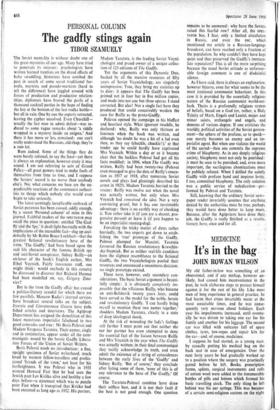MEDICINE
It's in the bag
JOHN ROWAN WILSON
My old father-in-law was something of, an obsessional, and if any mishap, however un- likely, had caused him inconvenience in the past, he took elaborate steps to protect himself against it for the rest of his life. Like most men of long experience in general practice, he had learnt that crises invariably occur at the most unsuitable times, and he was conse- quently very nervous about holidays. Each year his impedimenta increased, until eventu- ally he was driven to taking one car for his family and another for his luggage. The second car was filled with suitcases full of spare clothes, tyres, tow-ropes and repair kits for the car—and, of course, medicines.
I suppose he had started, as a young man, by casually putting his medical bag on the back seat in case of emergencies. Over the next forty years he had gradually worked up to a position where the surgery was practically gutted before he left. Books, prescription forms, splints, surgical instruments and rolls of cotton wool were added to the innumerable bottles of pills and lotions which formed his basic travelling stock. The only thing he left behind was his ear syringe. This was because of a certain semi-religious custom on the night before departure. The children were taken one by one into the surgery. and their ears thoroughly dewaxed. This ceremony marked the formal beginning of the holiday.
I haven't reached that stage yet. and in any case travel by plane doesn't permit such enor- mous quantities of luggage, but I do have a pack of emergency medicines which I would feel very unhappy without. All doctors carry such a pack, but they are often reluctant to recommend lay people to do the same, on the grounds that many of the medicines should be given only on the advice of a doctor. This is surely correct; moreover, it would be un- reasonable to expect the Health Service to finance prophylactic kits for the entire nation. However, there are occasions when one is travelling out of reach of ordinary European medicine and special precautions have to be taken.
For minor aches and pains and headaches, I take both aspirin and codeine. I prefer codeine because it seems to work as well but isn't so irritating to the stomach. I take plenty of indigestion tablets (Bisodol)—an absolute standby when that nameless oriental dish I like so much turns out to contain more green peppers than my inexperienced British stomach can handle. I take a tube of cascara tablets which I have used only once, on a very rough Atlantic voyage when not only my heart but all the rest of my vital functions seemed to stand still. And when travelling by ship I also take a sea-sickness remedy. Personally I favour Sea-Legs, a preparation of meclozine. since I have found it effective, and it doesn't make me quite as drowsy as some of the others.
Elastoplast and those tins of odd-shaped little dressings for pu.ting over cuts and bites are pretty well essential for people going abroad. But antiseptics are nowadays un- necessary. If a cut is clean it needs covering and leaving alone; if it is infected, an antibiotic by mouth is the correct treatment. Sunburn lotion has some value in reducing the full force of the ultra-violet rays and mosquito- repellent has at least some deterrent effect for a few hours—though those unfortunate indi- viduals who seem particularly attractive to the insect are unlikely to escape altogether.
All the remedies so far mentioned are minor remedies which can be bought without a doctor's prescription. There are also some useful drugs which have to be prescribed. Prominent among these are the antibiotics. The most useful is an antibiotic which can be given by mouth and which will attack as great a variety of bacteria as possible. My own stand- by for this is Achromycin (tetracycline), a so- called broad-spectrum antibiotic, which has as good a chance as any of hitting an un- identified infection. It isn't a complete answer to the gastro-intestinal infections which are so easily picked up abroad: for these I use Streptotriad, a mixture of Streptomycin and Sulphatriad, which is as effective as (anything against ordinary food poisoning. A subsidiary remedy for diarrhoea is Lomotil, which doesn't attack the infection but has a soothing effect on the most distressing of the symptoms.
For sleeping tablets (which I find indispen- sable on some of the beds I encounter) I favour Nembutal, and I also carry one or two remedies which I have found important for myself and my wife, such as hydrocortisone ointment for dermatosis, Anthisan for allergic' skin troubles, and those tiny hydrocortisone tablets which act so miraculously on painful ulcers in the mouth. I take an antimalarial if I am visiting the tropics. And, of course, a clinical thermometer.
This adds up to a fairly bulky package which makes inroads in one's 44 lb luggage allow- ance. Yet I haven't any doubt that it is worth it. Going to doctors in far-off countries is an experience to be avoided if possible. The language barrier is a problem and methods of treatment vary froni nation to nation-- it is only too easy to end up the consultation with a large bill and a boxful of mysterious sup- positories which inspire no confidence what- ever. Even if you by-pass the doctor and go straight to a chemist, it is still far from easy to get what you want. I remember a harrow- ing account by Graham Greene of how he once wandered unhappily around a Mexican village vainly searching for a priest to hear his confession. I know just how he felt. I have had the same kind of experience trying to buy a tube of ointment for athlete's foot.



















































 Previous page
Previous page